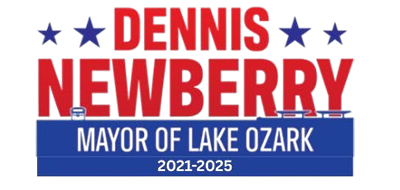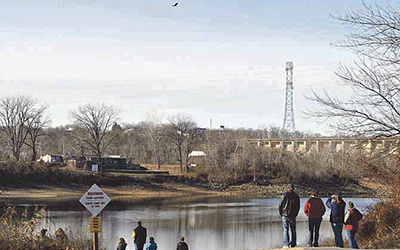A constitutional amendment to allow a gambling boat on the Osage River received mixed public testimony Tuesday.
Framed as a potential alternative to the Lake of the Ozarks casino in development by the Osage Nation, Senate Joint Resolution 14 would change Missouri’s Constitution to permit a casino boat on the Osage River between the Missouri River and Bagnell Dam at Lake Ozark.
Missouri’s Constitution allows for gambling boats to operate only on the Missouri and Mississippi rivers. SJR 14 would add the Osage River to that shortlist and direct the Missouri Gaming Commission to issue a single excursion gambling boat license for the Mid-Missouri river.
The resolution received a hearing in the Senate Emerging Issues Committee on Tuesday morning, garnering support from Miller County and Lake Ozark leaders and opposition from area residents. If approved by both chambers of the General Assembly, the issue will appear as a ballot question for voters in 2024.
“I’ve been asked by residents, business owners and local elected officials from the lake area to sponsor this bill,” said Sen. Justin Brown, R-Rolla. “With all the talk of a casino at the Lake of the Ozarks, they believe that residents of Missouri should have a say in whether we should have a casino at the lake or not.”
Brown said the proposed constitutional change stems from the casino the Osage Nation is building at the lake and is intended to “at least level the playing field” and ensure “there’s not any unfair competition within the community.”
The Osage Nation is planning a casino on the grounds of the former Quality Inn Hotel in the portion of the lake area that falls under Miller County. The $60 million development would bring the first tribal casino to Missouri. Construction of the casino, sports bar, restaurant and meeting space is awaiting approval from the U.S. Department of Interior.
As a sovereign nation, the Osage Nation casino would not be subject to the same taxing and regulation structures as other casinos in Missouri. Tom Robbins, a lobbyist on behalf of the Osage Nation, said the casino would still pay payroll taxes, such as Social Security and Medicare.
Brown said the Osage River gambling boat would be regulated and taxed the same as Missouri’s 13 licensed casinos. State gaming taxes are more than 25 percent of a casino’s total revenue with about a fifth of that amount retained by local governments.
It’s estimated a state-regulated gambling boat on the Osage River could generate at least $100 million in revenue, Brown said, and pay about $25 million in taxes with about $5 million going to city and county governments.
Lake Ozark Mayor Dennis Newberry said the city’s Board of Aldermen unanimously supports the resolution because it opens the way for significant investment in the Lake Ozark hospitality industry. The city lost all but two of its 12 motels in the past decade.
“And we’re one of Missouri’s largest tourist destinations,” Newberry said.
The city has a population of about 2,077 permanent residents but sees an influx of tens of thousands of tourists during the summer, he said. That results in city tax revenue contracting and expanding with the tourist season.
The city’s infrastructure, Newberry said, can support a population more than 10 times the number of permanent residents. But that infrastructure has about $30 million in capital improvements that need to be made and the city can’t fund them, he said. The city’s sales tax rate is at its statutory cap and road projects are not often eligible for grant funding.
“Our local resident population alone should not be strained by the burden to maintain infrastructure without smart growth that will provide the additional funding a tourist market like Lake Ozark must have,” Newberry testified.
“The expansion and contraction of revenue makes it difficult to provide quality and sustainable services to our residents and tourists,” he continued. “Any large business that operates for 12 months of the year will strengthen our revenue tremendously.”
Lake Ozark Alderman Matt Wright said the region’s existing tourism economy would make a gambling boat successful.
“The only thing making us separate from any other community that currently has a licensed casino operation is the waterway, which intersects our community,” Wright testified, noting that the Osage River eventually meets the locations where gambling is permitted.
Miller County Commissioner Don Abbett said the commission wasn’t enthusiastic about either of the casino options but chose to support the river casino plan because of the local taxes it would produce.
He said the funds can be used to support law enforcement, which he expects to need more of with the introduction of gambling to the area.
Miller County resident Andrew Prewitt said he was in support of the resolution because he sees the gambling boat as a win-win: Lake of the Ozark tourists have more entertainment options and the county can grow tax revenue and jobs.
Despite attracting 12 million tourists last year, Prewitt said city and county governments around the lake are hurting for tax revenue. The addition of gaming taxes could support infrastructure, public safety and school improvements, he said.
Miller County draws in around $40 million annually with more than 680 jobs, according to previous News Tribune reporting from 2022.
Joe Roeger, a Lake Ozark real estate developer for 40 years, testified in opposition to the resolution and asked for it to be expanded to incorporate any river in the state.
Roeger said property values decline 2-10 percent with the addition of a casino and suggested the Osage River was selected to target the “vibrant economy at the Lake of the Ozarks.”
Terry Taber, a lifelong Miller County resident, said he was against the resolution because casinos don’t encourage patrons to venture out into the community.
“It isn’t like it’s going to be a boon to all the other businesses,” he testified. “They’re going to keep them all there with rooms, food and, of course, gambling. And you’ve already got issues of Osage Tribe versus non-tribal. I just feel like we need to think about what is best for the people.”
Taber said he wants the Lake of the Ozarks to maintain a family-friendly atmosphere and the addition of casinos would disrupt that.
Gambling is “not the character of the Lake of the Ozarks,” Michael Egan, a Mount Rocky resident, said while testifying in opposition to the resolution.
Egan, who has been going to the lake since the 1960s, said he expects the introduction of casinos to provide an outlet for gambling addiction and negatively impact the income of area residents. He said he doesn’t expect it to attract patrons from out of state.
“The culture of the Lake of the Ozarks is a family-oriented tourist destination, and it would be irreparably damaged by drugs, prostitution, economic disaster and allocation of finite resources to infinite problems,” he said.
The Missouri Baptist Convention also testified in opposition to the resolution over religious objections to gambling and associated social impacts.
SJR 14: Excursion boat gambling on the Osage River
Sponsor: Sen. Justin Brown

